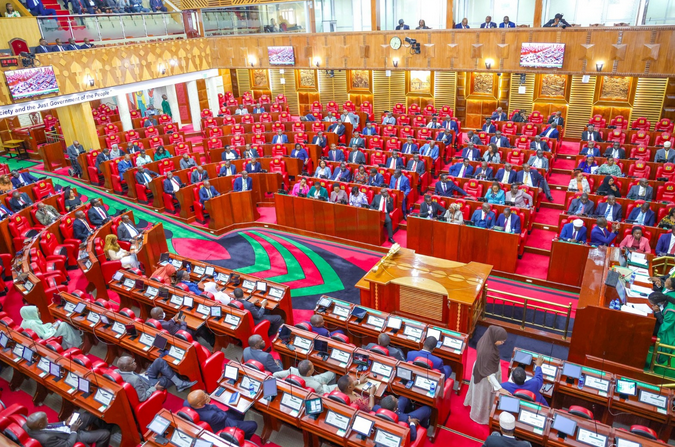
 Parliament
ParliamentGovernment’s ambitious labour migration strategy came under intense scrutiny this week as Labour CS Alfred Mutua appeared before senators to defend the handling of the job recruitment exercise.
The meeting with the Senate Committee on Labour and Social Welfare chaired by Julius Murgor (West Pokot), exposed systemic weaknesses that continue to hinder thousands of job-seekers from accessing employment abroad.
The ongoing inquiry stems from a statement requested in March, 2025, by Nominated Senator Gloria Orwoba, who sought clarity on the fate of candidates shortlisted for diaspora jobs.
Since February, 2024, some 41, 000 Kenyans have reportedly secured employment opportunities in foreign countries.
However, the figures were met with doubts by lawmakers who questioned the integrity of the process, transparency in job allocation and the treatment of workers once deployed.
At the centre of the deliberations was a Sh55,000 fee imposed on successful candidates following ministry-led recruitment drives.
Kajiado Senator Seki Lenku Ole Kanar demanded a full breakdown of the charges, clarity on medical screening costs and the budgetary allocation tied to the programme.
Nyamira Senator Okong’o Omogeni questioned why the Ministry and commercial recruitment agencies opted to send candidates for medical screening to private facilities instead of government institutions, which would be more affordable.
Mutua clarified that the medical facilities were selected by host countries after conducting due diligence.
He also defended the figure, stating it covered medical tests and processing costs, and assured the committee that refunds were available for candidates who opted out—minus medical expenses incurred.
Orwoba accused commercial recruitment agencies of repackaging government-to-government job offers and selling them to desperate job seekers.
The overseas labour export programme was suspended in December last year.
Meanwhile, the Senate Standing Committee on Energy chaired by Oburu Odinga sought answers over a probe into a 2015 oil spill in Thange village in Makueni county.
It emerged that villagers are still grappling with the devastating environmental and health consequences of the spillage.
In a petition presented to the committee, Thange MCA Erick Musyoki Katumo detailed how the spillage led to widespread land and water pollution.
Residents narrated how their farmlands had become infertile and water no longer safe for consumption.
“The oil spillage runs 15 feet beneath the ground. The aftermath continues to claim lives; cancer and kidney failure have become rampant,” Makueni Governor Mutula Kilonzo Jnr said.
The spillage from Kenya Pipeline Company, which occurred on May 12, 2015, was attributed to a suspected leak along the Mombasa-Nairobi pipeline.
While emergency teams were dispatched to contain and clean up the spill, by June 15 of the same year, petroleum traces had already contaminated the Thange River in Kibwezi East Constituency.
Nominated senator Beatrice Ogolla warned that if immediate restoration efforts are not undertaken, Thange village could become uninhabitable.
In a separate committee meeting, the Energy and Petroleum Regulatory Authority (Epra) responded to reported claims of curtailment of geothermal power generation between July and December 2024.
Epra told the Standing Committee on Energy that it does not issue directives to curtail geothermal energy.
It said the decisions are the responsibility of the System Operator at the National Control Centre, managed by Kenya Power.
The authority explained that dispatch of electricity to the national grid is determined by a range of technical and economic factors, including marginal generation costs, contractual obligations, demand, transmission constraints, and voltage stability.
“During peak hours in Kenya is when we import power from Ethiopia because solar and wind power are not used during the peak hours,” explained Joseph Oketch, EPRA Director of Electricity and Renewable Energy.















